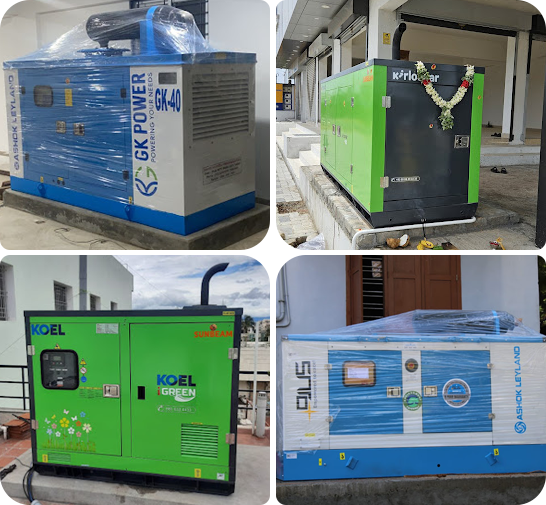Our experts are waiting for you! Contact now
Loading
Our experts are waiting for you! Contact now
Regular diesel generator servicing ensures optimal performance, prevents breakdowns, and extends equipment lifespan. Proper maintenance includes checking fuel quality, inspecting filters, and ensuring efficient cooling. Over time, carbon buildup and wear can reduce efficiency, leading to unexpected failures. Routine inspections help detect issues early, saving on costly repairs. Safety is crucial—keeping combustibles away and securing electrical connections minimizes hazards. Professional servicing improves fuel efficiency, reduces emissions, and enhances reliability during power outages. Whether for industrial, commercial, or residential use, scheduled maintenance keeps generators running smoothly. Trust expert technicians for thorough servicing, ensuring uninterrupted power and maximum efficiency when needed.




Routine inspections, oil changes, and filter replacements prevent wear, ensuring smooth operation and extended generator lifespan.

Avoid overloading or underloading by balancing power distribution, reducing strain on components, and improving overall fuel efficiency.

Use clean, high-grade fuel to minimize deposits, enhance efficiency, and prevent engine clogs for uninterrupted performance.


Regular maintenance is key to preventing common generator failures. Dirty fuel filters, clogged air filters, and low coolant levels can cause overheating, reduced efficiency, and system shutdowns. Frequent oil changes and checking for leaks help maintain engine health. Loose or corroded electrical connections can lead to power fluctuations and system failures. Overloading the generator beyond its capacity shortens its lifespan and increases wear. Monitoring battery health ensures smooth startups and prevents unexpected downtime. Keeping the exhaust system clean reduces carbon buildup, improving performance. Scheduling professional inspections helps detect potential issues early. By following these preventive measures, you can ensure long-term reliability, minimize costly repairs, and keep your generator running efficiently.
Check oil levels and quality to prevent engine wear, overheating, and ensure smooth generator operation.
Inspect battery charge, terminals, and connections to avoid startup failures and ensure consistent power supply.
Clean or replace fuel, air, and oil filters regularly to maintain efficiency and prevent clogs or contamination buildup.
Monitor coolant levels and radiator condition frequently to prevent overheating and ensure optimal engine performance.
Follow proper handling procedures, avoid overloading, and keep the generator in a well-ventilated area to prevent hazards.
Check fuel levels, oil condition, and electrical connections frequently to ensure optimal performance and prevent unexpected failures.
Identify unusual noises, voltage fluctuations, or starting issues early to address minor problems before major breakdowns occur.
Perform routine maintenance, replace worn-out parts, and use high-quality fuel to keep the generator running efficiently for years.
Generators should be serviced every 6 months or after 200 hours of operation.
Overheating occurs due to low coolant levels, clogged radiators, or excessive engine load.
Power loss may result from clogged fuel filters, weak batteries, or faulty alternators.
Regular maintenance, timely oil changes, and load testing help prolong generator efficiency and durability.
